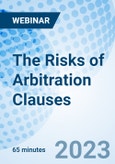Understand what using an arbitration clause means in practice.
Arbitration has a long history in the United States and international context for the resolution of commercial disputes. Arbitration has many proponents and many detractors. Many commercial form agreements default to arbitration, but the parties may have a limited understanding of the benefits and potential pitfalls of this method of dispute resolution. This topic will address the fundamental benefits and differences between arbitration and litigation. In addition, the presentation will provide a broad overview of the common pitfalls and risks of using arbitration to resolve your disputes. This presentation will provide a solid foundation for you to understand what using an arbitration clause means in practice.
Agenda
Arbitration Fundamentals
- Arbitration Historical Context
- Federal Arbitration Act and State Arbitration Codes
- Typical Clauses and Triggering Arbitration
Traditional Arguments: Arbitration vs. Litigation Risk and Expense
- Litigation vs. Arbitration Expense Argument
- The Slow Trial vs. the Speedy Arbitration
- Discovery: Do You Really Need It?
Pitfalls and Risk of Arbitration
- Don’t Like the Results Just Appeal, Right?
- The Substantive Law; Rules of Evidence; Three Judges: The Arbitration Hearing
- Enforcement of Arbitration Awards
Recent Trends in Arbitration; Old Assumptions Gone Bad
- Employment Arbitration and the New Transparency
- International Discovery-the ‘Tribunal’ Issue
- Rules, Rules, and More Rules-the Many Arbitration Systems and Rules
Speakers

Michael Jay Rune, II,
Carlton Fields, P.A.- Shareholder in the Miami office of Carlton Fields, P.A.
- Practice emphasizes construction, surety, and insurance law and related litigation since 1997
- Lectures on issues important to the construction industry; co-author of Liability and Performance Bond Surety in The Law of Performance Bonds (ABA 1999)
Who Should Attend
This live webinar is designed for attorneys, mediators, paralegals, and other legal staff.









